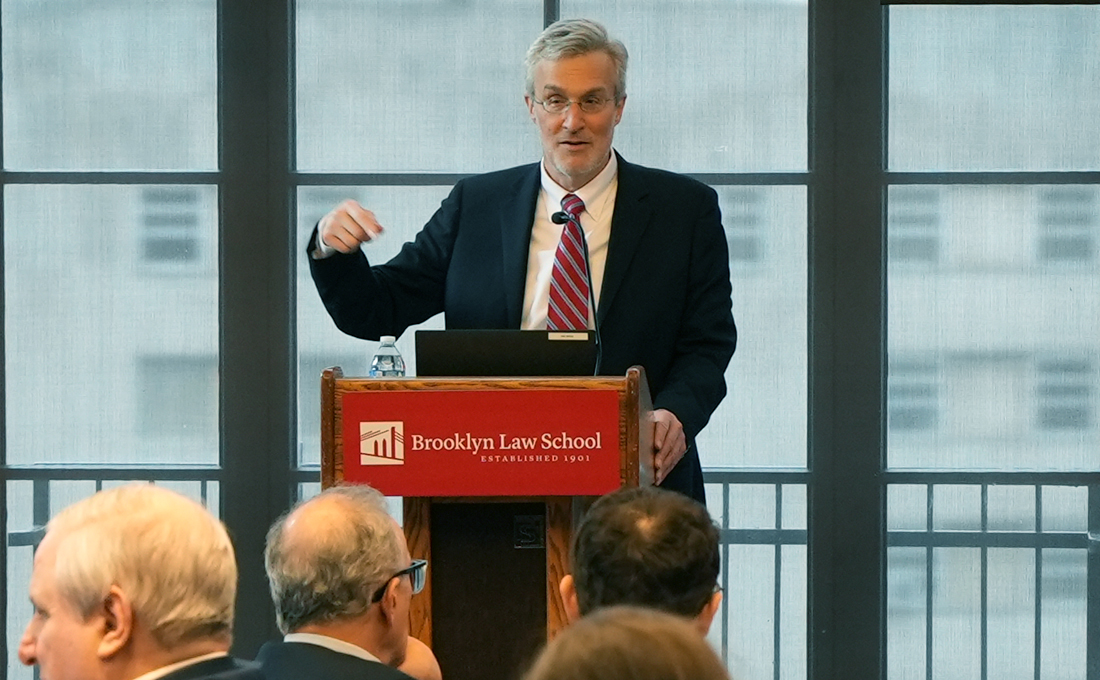Symposium Tackles Compliance and Regulation Challenges

Cary Coglianese, a professor at the University of Pennsylvania’s Carey School of Law, gives the keynote at a symposium and workshop on compliance sponsored by the Brooklyn Journal of Corporate, Financial & Commercial Law on Feb. 23.
Scholars in the field of compliance and regulation gathered to share their research and insights, discuss current challenges, and offer potential solutions on Feb. 23 at the symposium “Guiding Norms and Conduct: A Workshop on Compliance,” organized and led by Gerald Baylin Professor of Law James Fanto and sponsored by the Brooklyn Journal of Corporate, Financial & Commercial Law.
Keynote speaker Cary Coglianese, the Edward B. Shils Professor of Law at the University of Pennsylvania’s Carey School of Law, a professor of political science, and the director of the Penn Program on Regulation, proposed ways of building better regulatory compliance. These methods, he said, must be based on empirical evidence, not on the observational evidence that inspired a famous (and often misread) aphorism of the late Chester Bowles, head of the Office of Price Administration during World War II, which said that “Twenty percent of the regulated population will automatically comply with any regulation, 5 percent will attempt to evade it, and the remaining 75 percent will comply as long as they think that the 5 percent will be caught and punished.”
Given that empirical evidence shows that the rate of evaders is vastly higher than 5 percent, Coglianese said, “improving regulatory compliance requires more than just going after the ‘bad apples’ that attempt to evade compliance.” It can be accomplished, he proposed, through designing more enforceable regulations at the outset; using emerging technologies such as artificial intelligence (AI) to support enforcement; and more strongly promoting research to advise policymakers and regulators.
The session on expansive compliance featured presenters Professor Claire Hill, James L. Krusemark Chair in Law at the University of Minnesota, and Professor and Satell Fellow in Corporate Responsibility Stephen Park of the University of Connecticut School of Business. Hill examined directors’ duties to monitor corporations’ wrongdoings, in the more than 20 years after the In re Caremark International, Inc. Derivative Litigation.
“Caremark’s operation as a ‘soft law’ that, together with other forces promoting greater attention to societal interests, is bringing about considerable convergence between profit maximization and corporate social responsibility, broadly construed,” Hill said. Park explored the growth of social responsibility regulation and the challenges it presents to corporate compliance.
The specialized compliance session included a presentation by Professor Katrice Bridges Copeland, of Penn State Law School, who addressed the outlook for modernization of compliance program guidance standards for health care companies. Professor Nizan Geslevich Packin, of Baruch College’s Zicklin School of Business, explored the role and challenges of regulatory technology in automating compliance and governance, and the measures needed to integrate “regtech” responsibly and transparently.
Fanto and Professor Jennifer Pacella, of Indiana University’s Kelley School of Business, concluded the symposium with a session on regulating compliance. Pacella delved into the lack of a professional regulatory system for compliance officers. She advocated for a self-regulatory membership body for compliance officers, which would also avoid a “one size fits all” approach that currently exists in informal regulation.
Fanto discussed his research on international compliance codes, their significance and success, and what that success means for compliance officers in business firms. He explored the presentation of the codes as a kind of neutral business technology, and he reflected on how this presentation may favor an elite of compliance practitioners in large business organizations.
Also participating in the symposium were Brooklyn Law’s Vice Dean Miriam Baer, who welcomed the participants to the symposium; David M. Barse Professor of Law Edward Janger; and University of Connecticut School of Business Professor and Eversource Chair in Business Ethics Robert Bird.
Essays based on the symposium presentations will be published in a 2024 issue of the Brooklyn Journal of Corporate, Financial & Commercial Law.